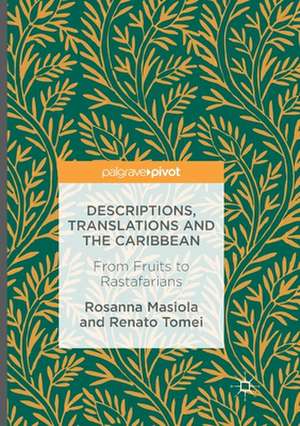Descriptions, Translations and the Caribbean: From Fruits to Rastafarians
Autor Rosanna Masiola, Renato Tomeien Limba Engleză Paperback – 23 iun 2018
| Toate formatele și edițiile | Preț | Express |
|---|---|---|
| Paperback (1) | 378.71 lei 43-57 zile | |
| Springer International Publishing – 23 iun 2018 | 378.71 lei 43-57 zile | |
| Hardback (1) | 384.86 lei 43-57 zile | |
| Springer International Publishing – 21 oct 2016 | 384.86 lei 43-57 zile |
Preț: 378.71 lei
Nou
Puncte Express: 568
Preț estimativ în valută:
72.46€ • 75.86$ • 59.96£
72.46€ • 75.86$ • 59.96£
Carte tipărită la comandă
Livrare economică 07-21 aprilie
Preluare comenzi: 021 569.72.76
Specificații
ISBN-13: 9783319822228
ISBN-10: 3319822225
Pagini: 143
Ilustrații: XI, 143 p.
Dimensiuni: 148 x 210 mm
Greutate: 0.2 kg
Ediția:Softcover reprint of the original 1st ed. 2016
Editura: Springer International Publishing
Colecția Palgrave Macmillan
Locul publicării:Cham, Switzerland
ISBN-10: 3319822225
Pagini: 143
Ilustrații: XI, 143 p.
Dimensiuni: 148 x 210 mm
Greutate: 0.2 kg
Ediția:Softcover reprint of the original 1st ed. 2016
Editura: Springer International Publishing
Colecția Palgrave Macmillan
Locul publicării:Cham, Switzerland
Cuprins
Chapter 1: Paradise Lost in Translation.- Chapter 2: Multilingual phytonymy: eco-translation and vernaculars.- Chapter 3: Songs and the Caribbean: invention and adaptation.- Chapter 4: Language Redemption: Bob Marley in Translation.
Notă biografică
Rosanna Masiola is Professor of English and Translation at the University for Foreigners of Perugia, Italy. Masiola is the author of twenty monographs, as well as edited works including West of Eden: Botanical Discourse Contact Languages and Translation (2009) and Law Language and Translation: From Concepts to Conflicts (2015), both with Renato Tomei.
Renato Tomei is Assistant Professor of English and Translation at the University for Foreigners of Perugia, Italy. He holds a PhD in Linguistics from the University of Addis Ababa, Ethiopia. Tomei is author of Jamaican Speech Forms in Ethiopia (2015), and co-author of Advertising Culture and Translation: From Commonwealth to Global (forthcoming).
Textul de pe ultima copertă
This book offers a new perspective on the role played by colonial descriptions and translation of Caribbean plants in representations of Caribbean culture. Through thorough examination of Caribbean phytonyms in lexicography, colonization, history, songs and translation studies, the authors argue that the Westernisation of vernacular phytonyms, while systematizing the nomenclature, blurred and erased the cultural tradition of Caribbean plants and medicinal herbs. Means of transmission and preservation of this oral culture was in the plantation songs and herb vendor songs. Musical creativity is a powerful form of resistance, as in the case of Reggae music and the rise of Rastafarians, and Bob Marley’s ‘untranslatable’ lyrics. This book will be of interest to scholars of Caribbean studies and to linguists interested in pushing the current Eurocentric boundaries of translation studies.
Rosanna Masiola is Professor of English and Translation at the University for Foreigners of Perugia, Italy. Masiola is the author of twenty monographs, as well as edited works including West of Eden: Botanical Discourse Contact Languages and Translation (2009) and Law Language and Translation: From Concepts to Conflicts (2015), both with Renato Tomei.
Renato Tomei is Assistant Professor of English and Translation at the University for Foreigners of Perugia, Italy. He holds a PhD in Linguistics from the University of Addis Ababa, Ethiopia. Tomei is author of Jamaican Speech Forms in Ethiopia(2015), and co-author of Advertising Culture and Translation: From Commonwealth to Global (forthcoming).
Caracteristici
Discusses the relationship between phytonyms of European language origin, indigenous origin and those associated with Creole languages Examines the first accounts and listings of plants by navigators and explorers and compares them to early botanical description Explores themes of language contact and language change brought about by colonization by European invaders








